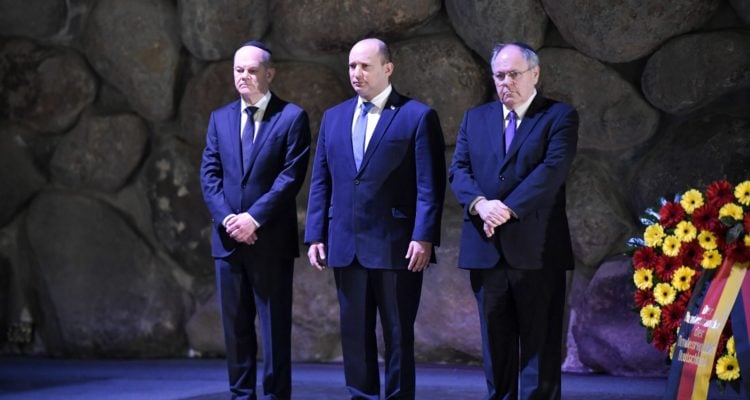For the first time since entering office, the German Chancellor arrived in Israel for a visit that was cut short due to the war in Ukraine.
By Aryeh Savir, TPS
German Chancellor Olaf Scholz arrived in Israel on Tuesday for his first visit to the Jewish state since entering office.
He was forced to shorten his visit due to the crisis in Europe generated by Russia’s invasion of Ukraine.
He began his trip to Israel on Wednesday with a visit to the Yad Vashem Holocaust memorial in Jerusalem together with Prime Minister Naftali Bennett.
Later, in a joint press conference, Bennet announced that the two countries have “agreed on the creation of new strategic cooperation. This will be in the format of a bi-annual dialogue on security and diplomatic matters. I think that this is a significant upgrade in our relations.”
Touching on the “very fateful and sensitive time” and the crisis following Russia’s invasion of Ukraine, Bennett asserted that “our obligation as leaders is to do our utmost to stop the bloodshed, to bring what is going on from the battlefield to the negotiating table as quickly as possible; it is still not too late.”
“To my regret, we in Israel have experience with wars. Their price is great as we have already seen. Unfortunately, it could get much worse.
“The State of Israel stands alongside the people of Ukraine. We have sent considerable humanitarian assistance – three planes with 100 tons of equipment, mostly medical – and we are determined to continue and even do more,” he said.
Turning to the talks between the West and Iran on a renewed nuclear deal, Bennett said, “We are also charged with the responsibility of making sure that Iran will have neither nuclear weapons nor the possibility of attaining them, not on our watch, not ever.”
“We are closely monitoring the talks in Vienna including the possibility that an agreement will be signed that allows Iran to install centrifuges on a broad scale within a few years. This possibility is unacceptable to us,” Bennett stated.
“Israel will know how to defend itself and ensure both its security and its future. We also expect our friends in the world not to countenance a massive installation of centrifuges in another two-and-a-half years, and to already prepare for the day after,” he demanded.
Foreign Minister Yair Lapid also met with Scholz.
The fact that the chancellor came “in such chaotic times is proof of the fact that even in a very unstable world, which has become more unstable in the last few days, the friendship between our peoples and between our countries is stable and firm, and the commitment you and your government have to this friendship is heartwarming to us all,” Lapid said.
Scholz was also later welcomed at the Knesset where he met with Knesset Speaker Mickey Levy.




